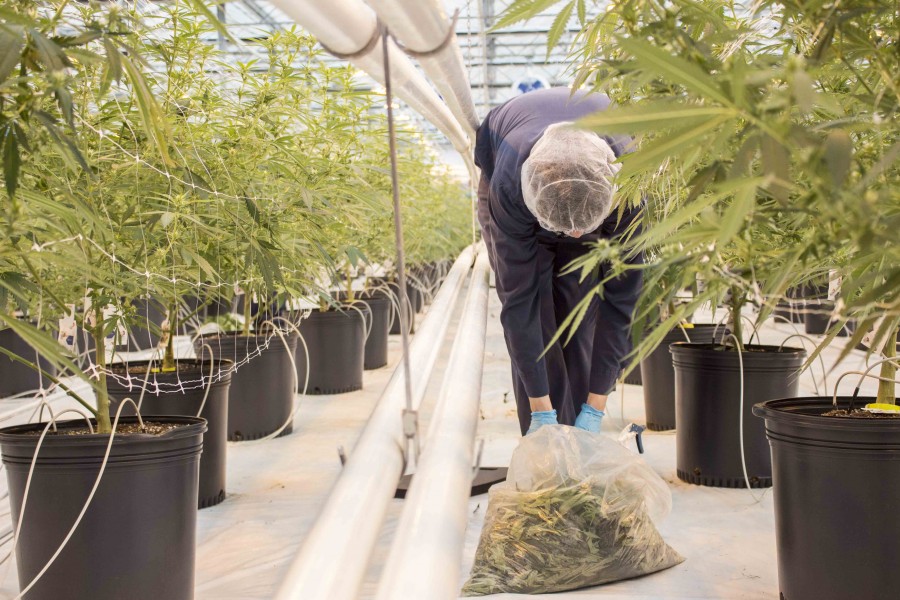While the Town of Niagara-on-the-Lake attempts to further restrict potential marijuana production facilities by increasing the distance they can be located from homes, churches, playgrounds, schools and other sensitive areas, one local greenhouse operation is already gearing up to sell recreational marijuana.
Jordan Sinclair, vice-president of communications for Canopy Growth, the parent company of Tweed Farms in NOTL, said the regulations for growing recreational marijuana as set out by Health Canada are similar, but less stringent in some areas than those controlling medical marijuana operations.
While controls on production, such as quality assurance, are the same, other regulations regarding items such as security and storage are less onerous, so facilities such as Tweed, with licences to produce and sell medical marijuana, would already meet regulations for recreational marijuana, said Sinclair.
Canopy Growth has secured contracts to supply retail outlets in some other provinces, but has nothing signed with the Ontario government, which Sinclair says will be the biggest market in the country.
“We've got teams of people working on that.”
He said there hasn't been a Health Canada licence issued yet in Canada under the new recreational marijuana legislation.
The recent provincial election may mean some changes in the way recreational marijuana can be sold in Ontario — while the previous Liberal government planned to set up stand-alone outlets controlled by the LCBO, Premier Doug Ford said during his election campaign he would consult with municipalities to see if that was the best way to go, and hinted he might be amenable to privatization.
Sinclair said Canopy Growth would be working on that as well, but doesn't expect an answer soon.
The federal government has said recreational marijuana will be available to consumers across the country by Oct. 17.
The size of commercial operations is licensed based on square footage, not the number of plants, and Tweed, already considered the world's largest legal marijuana operation when it was growing crops under 350,000 feet of glass, was licensed to expand on Concession 5 to one million square feet last April, and is ready to jump into the recreational market with product to sell.
Although the federal government has also legalized the large-scale growing of pot outdoors, and NOTL residents have expressed some concern about odour issues from any future outdoor operations, Sinclair says Canopy Growth has done its research and isn't interested in that type of expansion.
Even without the expensive infrastructure of indoor production, it's not as profitable, he said.
Growers would still have hurdles to clear and boxes to tick on extensive regulations such as security and odour control, and that would mean “substantial up-front costs,” he said.
“It would also mean we'd lose the ability to produce multiple crops a year.”
Tweed can harvest four to five crops a year, he said, which pushes the economics in favour of greenhouse production over outdoors.
The Town of NOTL, in considering new bylaws that would increase setbacks for marijuana operations from residential neighbourhoods, schools, churches and playgrounds, among other sensitive areas, is suggesting a greater setback for outdoor operations.
According to the draft bylaws — which are subject to a public meeting at the committee of the whole meeting Monday — any operation without a filtration system to control odours would have to be 300 metres from an area with a sensitive land use. Residents at a recent open house suggested that be changed to 500 metres.
Setbacks of 70 metres to residential, institutional or open space land, or closer than 150 metres to sensitive land uses, where there are filtration systems in place, have been recommended in the new bylaw, but residents at the open house recommended 70 metres be increased to 150 metres and 150 metres increased to 300 metres.
Those bylaws apply to production of medical and recreational marijuana, in rural and urban areas.
Planning director Craig Larmour said while Tweed's operation complies with the current requirements of the zoning bylaw, they would likely fall short of meeting setbacks in the new draft bylaw.
“Because Tweed was legally established, if they are unable to meet any new provisions, they would be considered to have legal non-conforming status,” Larmour said.










